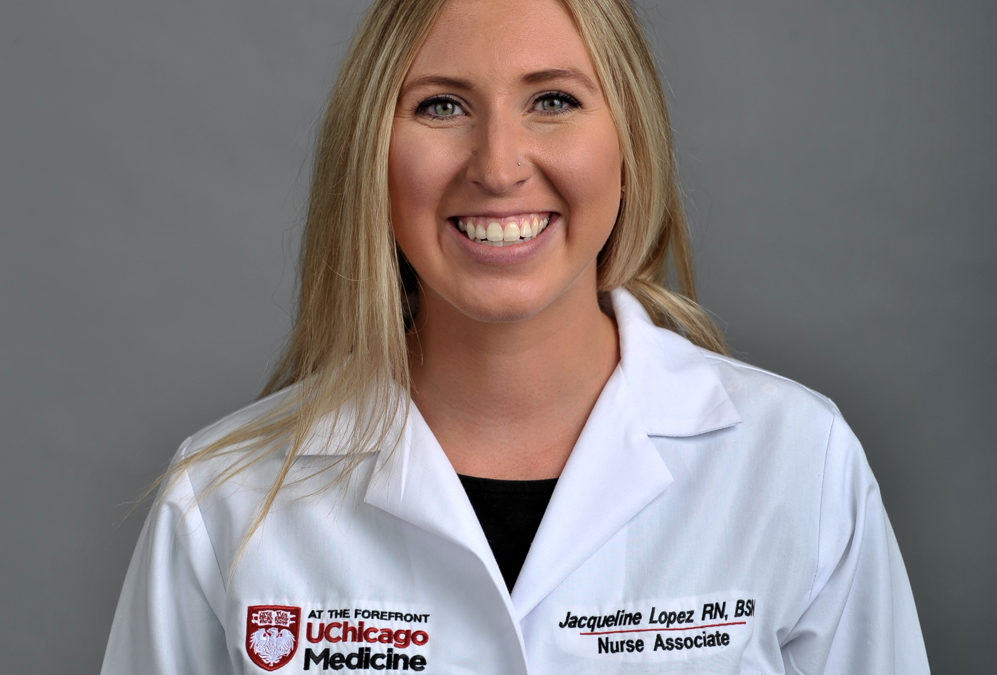Jackie says, “I remember rushing to the bathroom, and thinking, ‘that was weird. It must have been something I ate.’ After all, I was eating this weird dorm food for the first time. Then from that day, it never really went away. And after two or three weeks, I was like, ‘Okay, maybe this isn’t just a stomach bug.’”
After several weeks passed with no change to her symptoms, Jackie saw a gastroenterologist who diagnosed her with ulcerative colitis, and immediately referred her to David T. Rubin, MD, GIRF’s lead Scientific Advisor; the Joseph B. Kirsner Professor of Medicine; and Chief of the Section of Gastroenterology, Hepatology, and Nutrition at the University of Chicago Medicine. Dr. Rubin assured her that this was not normal, and that she would get better.
“He asked ‘How do you feel?’ and I said ‘I’m okay…’,” explains Jackie, “He said, ‘based on your colonoscopy, and the symptoms you’re having, this is not normal. You’re not okay. We need to get you back to okay again. You need to live a normal life. It isn’t normal to be having this many symptoms, and we can help.’”
After hospitalizations, courses of steroids and antibiotics, and trying many different medications to achieve remission, including biologics like infliximab (Remicade) and vedolizumab (ENTYVIO), Dr. Rubin and his team counseled Jackie to consider J-pouch surgery. J-pouch surgery is a three-step procedure where surgeons remove a patient’s diseased colon, create a pouch out of a section of small bowel, and connect the new structure so that it functions much like a colon within the patient’s body.
Jackie also transferred to nearby North Park University to be closer to her medical team at the University of Chicago Medicine, and also, for their well-regarded nursing program.
Explains Jackie, “When I was in the hospital, so sick, and thinking about surgery, the nurses were so important. They would say to me, ‘You aren’t living. You don’t have a good quality of life right now. So many people have had surgery, and they have been successful. You’re young and you’re a good candidate for it.’ I decided that I wanted to help people that same way.”
Jackie got her life back with her J-pouch, and also found her calling to work as a GI nurse. In fact, she now works directly with Dr. Rubin at the University of Chicago Medicine IBD Center, while she pursues her masters degree in nursing.
“While I was sick, when I was in nursing school, I had this blog, and I wrote, ‘I will be Dr. Rubin’s nurse one day.’ This is literally my dream job,” Jackie laughs.
Connecting with patients helps Jackie make meaning of all she has endured. “Talking to other young women is everything, because that’s what I needed when I was going through it all… It makes me tear up, because it’s just crazy how much sharing these stories can change lives, which is the whole reason why I wanted to do what I’m doing.”
No patient undergoes surgical treatment for ulcerative colitis and Crohn’s disease without careful consideration and thorough conversations with their medical team, but for Jackie, as a nurse, the benefits far outweigh the drawbacks.
“When you’re that sick, you’re surviving and you’re not living,” explains Jackie. “You’re literally just doing the bare minimum to make yourself feel better. Being twenty years old, or any age, you shouldn’t be bound to the bathroom or bound to your house or too scared to go on a walk outside. [With surgery] you can live your life… Now I don’t even think about it most days. Which I never thought would be possible.”

